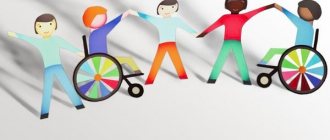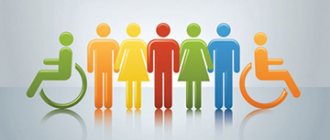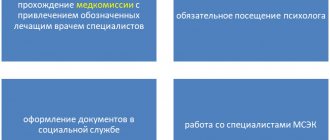The Constitution, as the main legislative act of our country, guarantees the fulfillment of obligations to the most vulnerable segments of the population - people with disabilities. This category of citizens who cannot provide themselves with normal living conditions through work.
The state provides benefits and financial support for people with disabilities who, after passing a medical and social examination for disability, can count on compensation. When establishing material payments, length of service is not a determining condition, but it does affect the amount of benefits.
What is ITU on disability
A commission consisting of competent specialists, based on research and the results obtained, makes a decision on assigning disability to a citizen and establishes the appropriate group.
Medical and social examination (MSE) determines not only the state of physical health, but also the social status of a citizen. The commission includes not only doctors, but also psychologists.
Medical examination for disability solves the following problems:
- identifies the degree of disability;
- determines the need for citizen support;
- recommends rehabilitation programs taking into account the individual characteristics and approach to the condition of a person with disabilities.
Law
The legislation regulates the ITU procedure with the main acts:
- Federal Law “On the Protection of Disabled Persons in the Russian Federation”;
- Resolution No. 95 of February 20, 2006;
- Directives and orders from relevant departments.
Who is entitled to
Every citizen of retirement age, in the event of illnesses that limit his physical and social activity, can undergo a commission and receive disability. The opinion that a pensioner cannot count on state support in the event of such circumstances is unfounded.
Diseases that contribute to obtaining this status include:
- disturbances in the functioning of the brain and heart;
- detection of cancer;
- diabetes;
- health conditions that limit movement;
- visual and hearing impairments.
Having passed the ITU and received disability, a pensioner is entitled to the following support measures from the state:
- purchasing medicines at a reduced price;
- material compensation;
- benefits for using transport, paying for utilities.
For some categories of older people, obtaining disabled status is necessary and helps them maintain a normal standard of living.
Where is ITU held?
An examination is carried out in specialized organizations - the bureau of medical and social examinations. In regions, especially rural settlements, the bureau receives residents of several districts at once.
The ITU Main Bureau oversees the activities of the regional offices. It receives and considers citizens' appeals regarding inappropriate decisions of subordinate commissions.
The entire structure is controlled by the federal level bureau ITU, which is located in Moscow.
Main functions of the main bureau of medical and social examination
The main bureau performs the following functions:
a) conducts a medical and social examination of citizens who have appealed the decisions of the bureau, including using the EAVIIAS, as well as a medical and social examination in the direction of the bureau in cases requiring special types of examination or an advisory opinion of the expert composition of the main bureau, using special diagnostic equipment; b) when monitoring the decisions of the bureau, conducts a repeated medical and social examination of citizens who have undergone a medical and social examination in the bureau, using special diagnostic equipment and, if there are grounds, changes or cancels the decisions of the bureau; c) considers complaints from citizens about the actions (inaction) of the bureau and their officials during the medical and social examination, and if they are found to be justified, takes measures to eliminate the identified shortcomings; d) provides citizens undergoing medical and social examination with explanations on issues of medical and social examination; e) creates a data bank about citizens living in the serviced territory who have passed a medical and social examination, including using the EAVIIAS; carries out state statistical monitoring of the demographic composition of disabled people living in the serviced territory; f) participates in the development of programs for the rehabilitation of disabled people, disability prevention and social protection of disabled people; g) coordinates the activities of the bureau and generalizes the experience of their work in the serviced territory; h) in the case of a medical and social examination: establishes the fact of the presence of disability, the group, causes, duration and time of onset of disability, and also develops individual rehabilitation programs for disabled people, including determining the types, forms, timing and volumes of measures for medical, social and vocational rehabilitation; determines the degree of loss of professional ability to work (as a percentage); determines permanent disability; determines the need for medical, social and professional rehabilitation for victims of industrial accidents and occupational diseases, and also develops rehabilitation programs for victims of industrial accidents and occupational diseases; determines the need for health reasons for constant outside care (assistance, supervision) of a father, mother, wife, brother, sister, grandfather, grandmother or adoptive parent of citizens called up for military service (military personnel serving under a contract); i) determines the causes of death of a disabled person, as well as a person injured as a result of an industrial accident, occupational disease, disaster at the Chernobyl nuclear power plant and other radiation or man-made disasters, or as a result of injury, concussion, injury or disease received during military service services, in cases where the legislation of the Russian Federation provides for the provision of social support measures to the family of the deceased; j) organizes and conducts meetings of specialists from federal government institutions of medical and social expertise on organizational and methodological work; k) organizes and conducts on-site meetings of specialists of the expert composition of the main bureau on the basis of medical organizations.
Preparation for medical and social examination
Citizens who are sent for examination for the first time undergo the following training:
- receive a referral from the attending physician;
- prepare a package of documents;
- pass the commission;
- receive the commission's decision.
If the commission members were unable to reach a common opinion, the ITU for the citizen is re-appointed.
Registration of directions
A referral to medical examination is a document on the basis of which a citizen receives the right to undergo an examination that assesses the impact of his diseases on his life and social capabilities, as well as identifying the need for rehabilitation.
Referrals issued by medical organizations comply with the format approved in document 77 of the Ministry of Health and Social Development. This document will indicate the results of the studies done and tests taken, as well as confirm the need for rehabilitation. The severity of the disease and possible limitations in ability to work are indicated.
Similar referrals from the Pension Fund or from social protection authorities are regulated by document 874 of the same department. The main difference is that the presence of limitations that a person experiences are considered not as a fact, but as a possibility of needing social support.
Petition
It is recommended that you fill out the application legibly and without erasures.
Items included in the forms:
- FULL NAME. citizen;
- passport data;
- SNILS;
- request for direction;
- the reason and purpose of the ITU;
- the need for a sign language interpreter or other services;
- method of calling a commission;
- consent to the processing of personal data;
- date and personal signature;
- power of attorney number and passport details for the citizen’s representative.
Other forms:
Form of sending sheet form 088/у-06 Completed sample of sending sheet for ITU
Required documents
The following disability documents are attached to the MSEC application:
- referral from the attending physician;
- copy of the passport;
- SNILS;
- a copy of the pension certificate;
- certificate of pensioner status from the Pension Fund of Russia;
- for working pensioners - a certified copy of the work record book;
- medical statements confirming health status.
Contacting the Bureau for Expertise
Bureau employees set a date for the commission within 30 days after receiving the application.
Elena Smirnova
Pension lawyer, ready to answer your questions.
Ask me a question
The results of the decision (in case of refusal) can be challenged in higher organizations or in court.
Visit to the Pension Fund for benefits
In case of a positive decision, the pensioner is issued a certificate of the established form. On its basis, the citizen applies to the pension fund to assign compensation and to the social security authorities to receive benefits.
What is a medical and social examination?
15.09.2020
What is a medical and social examination?
Medical and social examination (MSE) is one of the types of medical examination.
In accordance with Article 7 of the Federal Law of November 24, 1995 No. 181-FZ “On Social Protection of Disabled Persons in the Russian Federation”, medical and social examination is the recognition of a person as disabled and determination in the prescribed manner of the needs of the examined person for social protection measures, including rehabilitation, based on an assessment of life limitations caused by a persistent disorder of body functions.
Recognition of a citizen as disabled is carried out during a medical and social examination based on a comprehensive assessment of the state of the citizen’s body based on an analysis of his clinical, functional, social, professional, labor and psychological data using classifications and criteria approved by the Ministry of Labor and Social Protection of the Russian Federation.
The procedure for conducting MSE of a citizen is determined by the “Rules for recognizing a person as disabled”, approved by Decree of the Government of the Russian Federation of February 20, 2006 No. 95, as well as by the “Administrative Regulations for the provision of public services for conducting medical and social examination”, approved by order of the Ministry of Labor and Social Protection of the Russian Federation dated January 29, 2014 No. 59n.
The state service for conducting MSE to a citizen is provided at federal government MSA institutions. Currently, a 3-level ITU system has been created in the Russian Federation: ITU Bureau, ITU Main Bureau and ITU Federal Bureau.
MSA is carried out in the bureau at the place of residence (at the place of stay, at the location of the pension file of a disabled person who has left for permanent residence outside the Russian Federation). If a citizen cannot appear at the MSA bureau for health reasons, which is confirmed by the conclusion of the medical commission of a medical organization, then MSA can also be carried out at home, in the hospital of a medical organization, in a social service organization that provides social services in an inpatient form; in a correctional institution or in absentia.
From March 1 to October 1, 2021, according to the “Temporary procedure for recognizing a person as disabled,” approved by Decree of the Government of the Russian Federation of April 9, 2021 No. 467, the examination is carried out exclusively in absentia, on the basis of documents from medical institutions without visiting the bureau of medical and social examination.
As a rule, a citizen is sent to MSA by a medical organization, regardless of its organizational and legal form, or less often, by the body providing pensions, or by the social protection body with the written consent of the citizen (his legal or authorized representative). If the above organizations refuse to send a citizen to the ITU, he is issued a certificate of refusal, on the basis of which the citizen (his legal or authorized representative) has the right to contact the bureau independently.
A medical organization refers a citizen to medical examination after carrying out the necessary diagnostic, therapeutic and rehabilitation or habilitation measures if there is data confirming a persistent impairment of body functions caused by diseases, consequences of injuries or defects.
In the referral to MSA, the medical organization indicates data on the citizen’s health status, reflecting the degree of dysfunction of organs and systems, the state of the body’s compensatory capabilities, information on the results of medical examinations necessary to obtain clinical and functional data depending on the disease for the purpose of MSA, and rehabilitation or habilitation activities.
MSA is carried out by specialists of the bureau (main bureau, Federal Bureau) with the written consent of the citizen (his legal or authorized representative) by examining the citizen and studying the documents submitted by him.
The conditions for recognizing a citizen as disabled are: impairment of health with a persistent disorder of body functions caused by diseases, consequences of injuries or defects; limitation of life activity (complete or partial loss by a citizen of the ability or ability to provide self-care, move independently, navigate, communicate, control one’s behavior, study or engage in work); the need for social protection measures, including rehabilitation and habilitation. The presence of one of these conditions is not a sufficient basis for recognizing a citizen as disabled.
Depending on the severity of persistent disorders of body functions resulting from diseases, consequences of injuries or defects, a citizen recognized as disabled is assigned disability group I, II or III, and a citizen under the age of 18 is assigned the category “disabled child.”
The decision to recognize a citizen as disabled or to refuse to recognize him as disabled is made by a simple majority of votes of the specialists who conducted the MSA, based on a discussion of the results of his MSA, within a period not exceeding 30 calendar days from the date of registration of the referral for the MSA.
A citizen recognized as disabled is issued a certificate confirming the fact of disability, and an individual rehabilitation or habilitation program is developed.
According to the Temporary Procedure for Recognizing a Person as Disabled, a certificate confirming the fact of the establishment of disability and an individual rehabilitation or habilitation program for a disabled person (disabled child) before October 1, 2021, are sent to the citizen only by registered mail in compliance with the requirements of the legislation of the Russian Federation on personal data.
A citizen who is not recognized as disabled, at his request, is issued a certificate of the results of the ITU.
A citizen (his legal or authorized representative) can appeal the bureau’s decision to the main bureau within a month on the basis of a written application submitted to the bureau that conducted the ITU, or electronically using the FSIS “Unified Portal of State and Municipal Services” (email address - www .gosuslugi.ru). The decision of the main bureau can be appealed within a month to the Federal Bureau on the basis of an application submitted by the citizen (his legal or authorized representative) to the main bureau that conducted the ITU, or to the Federal Bureau. Decisions of the bureau, the main bureau, or the Federal Bureau can be appealed to the court by a citizen (his legal or authorized representative).
Head of ITU Bureau No. 6 Yuri Ulyanov
Explanations on the procedure for providing public services for conducting a medical and social examination can be obtained from the bureau of medical and social examination in Nefteyugansk.
phone numbers for consultations:
Bureau No. 6;;
Bureau No. 7;;
Email:
Bureau No. 6;
Bureau No. 7;
ITU procedure
The examination is a consultation of medical specialists in various fields who get acquainted with the submitted documents and ask additional clarifying questions regarding the state of health. It is also necessary to provide information about family composition, income and other living conditions of a person.
After receiving this information, the commission makes a decision on recognizing or not recognizing the citizen as disabled. This decision is communicated to the pensioner on the same day.
Patients who are unable to move are examined at home.
Conditions for recognition as disabled
It is regulated at the legislative level that bureau employees are obliged to notify the citizen who submitted the application about the procedure for recognizing him as a disabled person and provide appropriate explanations on all issues that arise.
Criteria for assigning disabled status:
- loss of health with obvious impairment of body functions;
- loss of normal life activities and the ability to independently care for oneself, move, influence behavior and work;
- the need for rehabilitation actions and social protection measures.
Duration of disability
Disability is established for the following periods:
- 1 group – 2 years;
- 2.3 groups – for 1 year;
- If the disabled person is a child, it is set for 1, 2, 5 years or up to 18 years.
In some cases, an MSEC certificate of disability is issued without a specific period.
Reasons for re-examination
If the commission cannot come to a decision, the medical and social examination is re-appointed. In this case, additional documents may be required to make a final verdict.
Elena Smirnova
Pension lawyer, ready to answer your questions.
Ask me a question
It should be borne in mind that systematic re-examination may become a reason for removing disability or changing the group category. Also, disability can be lifted if there are compelling reasons for this.








